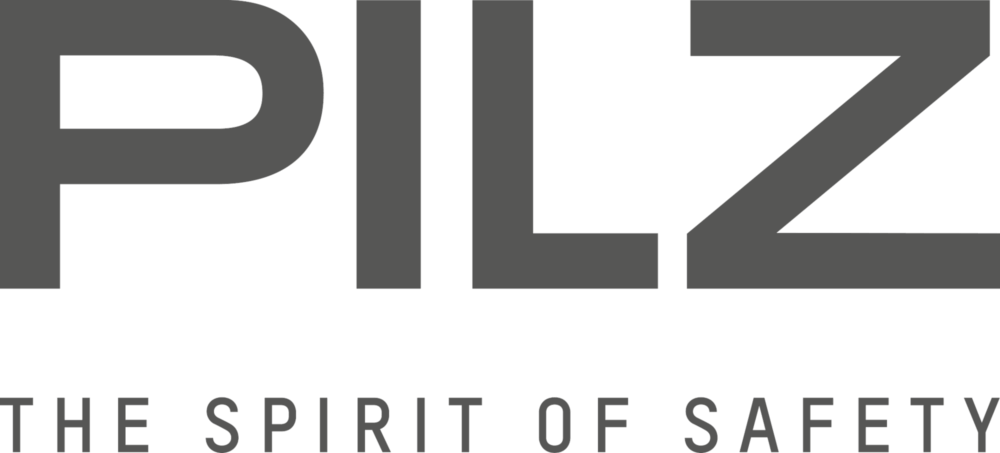Classroom and online trainings
Here you will find our classroom and online trainings – distributed throughout south eastern europe.
If you have any questions about the training program, please contact us – we will help you!
CMSE® - Certified Machinery Safety Expert
Order-No. 1T000047
Objectives
In cooperation with TÜV NORD, Pilz offers the qualification for CMSE – Certified Machinery Safety Expert. The four-day course gives a general overview of the topic of machine safety and is divided into five modules that impart extensive knowledge about the machine life cycle. The CMSE modules are standardized worldwide and at a uniform level. The final TÜV NORD certificate is also internationally valid.
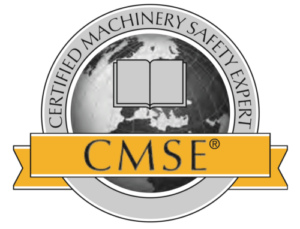
Contents
Module 1: Introduction to safety
- Introduction to the relevant safety regulations
- Responsibilities
- Introduction to safety management systems
Module 2: Machinery safety
- Legislation relating to the design, manufacturing and maintenance of machinery and work equipment
- Conformity requirements and procedures for placing machinery on the market
- Work equipment and workplace regulations
- Consideration of occupational health and safety in relation to machines, including ergonomics, noise, vibration and chemical substances
Module 3: Risk assessment
- Risk assessment according to EN ISO 1200
- Application and use of other relevant machine standards within the risk assessment process
- Brief overview of risk reduction after completion of the risk assessment
Module 4: Safeguarding
- International requirements of the standards regarding mechanical protection devices
- Protection devices: definition, types and examples of use
- Calculation of the safety distances according to
EN ISO 13857
Safety components and -technologies
- Overview of safety components
- Requirements and applications, advantages and disadvantages (e.g. interlocking devices, light curtains, two-hand control devices)
- Technical and supplementary protective measures (e.g. protective fences, light barriers, emergency stop command devices)
- Safety-related applications of control systems
Electrical safety requirements
- Detailed consideration of EN 60204-1:
- Electrical equipment of machines and plants
- Viewing the electrical design from infeed to proper verification
- Safe operation and maintenance of electrically operated machines
Module 5: Functional safety of control systems
- Detailed consideration of the requirements of EN ISO 13849
- Specification, design and validation of functional safety control systems
- Determination of Performance Level (PL) and Safety Integrity Level (SIL) in relation to safety functions
- Choosing the architecture based on practical examples of how to implement categories
- Software Life Cycle: Requirements and Application
- Verification and Validation Procedures
- Introduction to EN/IEC 62061
Target group
– Designers / Engineers
– Technical manager
– System integrators
– Occupational safety representatives / managers
– Operators of machinery and systems
– Maintenance / repair personnel
Certificate
The seminar includes a multiple choice test. If the test is passed, the participants receive the internationally recognized TÜV NORD certificate as “CMSE – Certified Machinery Safety Expert”, which is valid for four years. The one-day recertification extends the validity by a further four years.
Detailed information, conditions of participation and registration at www.cmse.com. There you will receive all information about the CMSE and you can test your knowledge with the CMSE quiz.
We can also offer the exam in another language if required. Please give us the relevant information when registering.
Requirements
Admission to the CMSE seminar requires experience and at least basic knowledge of the subject. Not sure if your current qualification meets the required level? Then get in touch with us. We advise you individually and show you possible alternatives with which you can reach the qualification level for the CMSE.
| Place | Duration | Time | Max. attendees | Costs per attendee | Date |
|---|---|---|---|---|---|
| Online (USA) | 7 sessions + 1 exam session | Start: 11:00 EST | 15 people | $ 2782,-- | 21.01.-31.01.2025 |
| Online (Europe) | 7 sessions + 1 exam session | Start: 09:00 CET | 15 people | € 2400,-- | 12.05.-22.05.2025 |
| Online (USA) | 7 sessions + 1 exam session | Start: 11:00 EST | 15 people | $ 2782,-- | 10.06.-20.06.2025 |
| Class-Room (Ljubljana, SLO) | 5 sessions incl. exam | 08:30-16:30 CET | 15 people | € 2650,-- | 16.06.-20.06.2025 |
| Online (Asia) | 7 sessions + 1 exam session | Start: 12:30 AEDT | 15 people | € 2200,-- | 17.06.-27.06.2025 |
| Online (USA) | 7 sessions + 1 exam session | Start: 11:00 EST | 15 people | $ 2782,-- | 04.11..-14.11.2025 |
| Online (Asia) | 7 sessions + 1 exam session | Start: 12:30 AEDT | 15 people | € 2200,-- | 01.12.-11.12.2025 |
| Online (Europe) | 7 sessions + 1 exam session | Start: 09:00 CET | 15 people | € 2400,-- | 01.12.-11.12.2025 |
| Online (USA) | 7 sessions + 1 exam session | Start: 11:00 EST | 15 people | $ 2782,-- | 09.12.-19.12.2025 |
| In-House | 5 days incl. exam | 08:30-16:30 | 15 people | on request | on request |
CECE - Certified Expert in CE Marking
Order-No. 1T000127
Zielsetzung
Mit CECE – Certified Expert in CE Marking erreichen Sie die höchstmögliche Qualifikation im Bereich CE-Kennzeichnung.
Im Rahmen dieses Qualifizierungsprogramms wird der gesamte CE-Kennzeichnungsprozess gemäß Maschinenrichtlinie 2006/42/EG anhand eines virtuellen Maschinenmodells von der Risikobeurteilung bis zur Anbringung der CE-Plakette verdeutlicht. Das Modell zeigt die Unterschiede in der Vorgehensweise bei unvollständigen und vollständigen Maschinen sowie darüber hinaus bei verketteten Maschinen.
Die Qualifizierung zum CECE ist vom TÜV-NORD zertifiziert. Nach bestandener Prüfung erhalten Sie ein weltweit anerkanntes TÜV NORD-Zertifikat sowie den Titel „CECE – Certified Expert in CE Marking“.

IQP Level
Expert

Inhalte
- Gesetzeslage zur Maschinensicherheit in Europa
- Richtlinien zum Thema CE-Kennzeichnung
- die 6 Schritte der CE-Kennzeichnung
- Rollen und Zuständigkeiten von Importeur/Distributor,
Betreiber, Hersteller und Bevollmächtigtem
Gesetzliche Rahmenbedingungen
- Maschinenrichtlinie im Einzelnen:
Struktur, Umfang und Ausschlüsse - weitere relevante Richtlinien
wie z. B. EMV- oder ATEX-Richtlinie
Definition der Anforderungen
- grundlegende Bedingungen bestimmen
- Einsatz von Normen, technischen Spezifikationen
Richtlinien, Risikobeurteilung etc.
Vorgehensweisen zur Konformitätsbewertung
- Module zur Vorgehensweise bei der
Konformitätsbewertung - Inanspruchnahme von Prüfstellen
Verifizieren der Konformität
- Konstruktionsphase
- Produktionsphase
- Überprüfung
Technische Dokumentation
- Anforderung und Zusammenstellung von technischen Unterlagen
- Konformitäts- und Einbauerklärung
- Platzieren und Verwenden der CE-Plakette
Zielgruppen
– Inbetriebnehmer
– Konstrukteure
– Projektleiter
– Planer
– Systemintegratoren
– Sicherheitsbeauftragte
– Produktionsleiter bzw. -verantwortliche
– Verantwortliche für Umbauten und Instandhaltung
– Technische Einkäufer
Voraussetzungen
Teilnahme an der Schulung „Grundlagen der CE- Kennzeichnung“
oderSie besitzen bereits die Qualifizierung zum
ZMSE Zertifizierter Maschinensicherheitsexperte
oderSie besitzen bereits die Qualifizierung zum
CMSE Certified Machinery Safety Expert
Ihre Vorteile

umfassende Kenntnisse zum Konformitätsbewertungsprozess nach Maschinenrichtlinie
bis hin zur Anbringung des CE-Kennzeichens

Profitieren Sie von der Erfahrung unserer Experten. Nach dieser Qualifizierung können Sie – dank der detaillierten Anwendungsbeispiele und der Teilnahme an den Praxis-Workshops – Ihr erworbenes Wissen direkt in die Praxis umsetzen.

Erreichen Sie die höchstmögliche Qualifikation im Bereich CE-Kennzeichnung in nur zwei Tagen.
CEFS - Certified Expert in Functional Safety
Order-No. 1T000184
Zielsetzung
Die vom TÜV NORD zertifizierte und international anerkannte Qualifizierung zum CEFS – Certified Expert in Functional Safety bietet Fachwissen rund um die funktionale Sicherheit von Maschinen. Sie erfahren in der Expertenschulung, welche normativen und technischen Anforderungen an ein solches System gestellt werden. Vom Design über die Verifizierung bis zur Umsetzung und Validierung werden alle zentralen Elemente beleuchtet.
Die Qualifizierung bietet Ihnen umfassendes Knowhow zu den entsprechenden Normen sowie eine praxisorientierte Betrachtung der Erstellung von komplexen Sicherheits-systemen. CEFS beinhaltet eine Reihe von Workshops, in denen Sie konkrete Themen im Anwendungsfall erlernen.
Nach bestandener Prüfung erhalten Sie ein vom
TÜV NORD ausgestelltes, unabhängiges Zertifikat zum Nachweis Ihrer Qualifikation. Das Zertifikat ist weltweit anerkannt und berechtigt Sie zum Tragen des Titels „CEFS – Certified Expert in Functional Safety“.

IQP Level
Expert

Inhalte
Basiswissen funktionale Sicherheit
- Basics von Sicherheitssteuerungssystemen
Anwendung und Umsetzung von Performance Level (PL) und Safety Integrity Level (SIL)
- Safety Requirement Specification
- Workshop 1 „Erstellung einer Safety Requirement Specification“
Design eines Sicherheitssteuerungssystems
- Architekturen von Schaltkreisen
- Verhindern und Steuern von systematischen Ausfällen
- Workshop 2 „Aufteilung in Subsysteme“
- Workshop 3 „Bestimmung der Wahrscheinlichkeit eines zufälligen Hardwareausfalls“
- Workshop 4 „Überprüfung der systematischen Anforderungen, einschließlich sicherheitsrelevanter Software“
Validierung eines Sicherheitsschaltkreises
- Erstellung eines Validierungsplans und -protokolls
- Workshop 5 „Entwerfen eines Validierungsprotokolls“
- Einsatz von Softwaretools zur Validierung
- Workshop 6 „Softwarebasiertes Review des Safety Levels“
Expertenwissen funktionale Sicherheit
- Sonderfälle
- Lösungsorientierte Übung „Funktionale Sicherheit in der praktischen Anwendung“
- Anforderungen an ein Functional Safety Management System und deren Umsetzung im Unternehmen
Zielgruppen
– Inbetriebnehmer
– Konstrukteure
– Projektleiter
– Planer
– Systemintegratoren
– Sicherheitsbeauftragte
– Programmierer
– Verantwortliche für Umbauten und Instandhaltung
Voraussetzungen
- Vorkenntnisse zum Thema funktionale Sicherheit oder
- Teilnahme an einer eintägigen Pilz Schulung oder einer anderen adäquaten Schulung zum Thema funktionale Sicherheit, z. B. „Funktionale Sicherheit nach EN ISO 13849“,
oder - Sie haben bereits die Qualifizierung CMSE – Certified Machinery Safety Expert
Ihre Vorteile

Lernen Sie, wie Sie Systeme zur funktionalen Sicherheit erfolgreich validieren – stets in Übereinstimmung mit der aktuellen Normenlage.

Verstehen Sie alle Details zu den
Auswirkungen von Engineeringentscheidungen auf die Zuverlässigkeit und Verfügbarkeit
des Steuerungssystems.

Während des gesamten Trainings wird im Rahmen der Workshops ein virtuelles Maschinenmodell eingesetzt. Praxisnahes Lernen ist so garantiert.
CESA - Certified Expert for Security in Automation
Order-No. 1T000201
Zielsetzung
Bedrohungen in Form von Cyberangriffen auf die industrielle Umgebung von Unternehmen nehmen stetig zu und stellen eine große Bedrohung aber auch eine Herausforderung für die sogenannte OT (Operational Technology) Sicherheit dar.
Es wird daher zunehmend wichtiger, dass die Verfügbarkeit von Maschinen und Anlagen trotzdem sichergestellt werden kann. Speziell auf diese Herausforderungen haben wir die Qualifizierung zum „CESA – Certified Expert for Security in Automation“ ausgerichtet.
Der vom TÜV NORD zertifizierte Expertenlehrgang vermittelt umfangreiches Wissen von der Konzeption bis hin zur Umsetzung aller notwendigen Securitymaßnahmen im industriellen Umfeld.
Durch richtige Anwendung der Norm IEC 62443 können Betreiber, Integratoren und Hersteller nachweisen, dass ihre industriellen Automatisierungssysteme modernen Cybersicherheitsstandards entsprechen. Doch welche spezifischen Anforderungen müssen erfüllt werden und was ist bei der Umsetzung zu beachten? Dieses Seminar ist speziell auf IEC 62443 zugeschnitten und vermittelt Ihnen das entsprechende Fachwissen.

IQP Level
Expert

Inhalte
- Einführung und Motivation für CyberSecurity in der industriellen Automation
- Struktur der CyberSecurity (Defense in Depth)
- Unterschied zwischen IT und OT
- Anforderungen der IEC 62443
- Verantwortlichkeiten und Rollenverteilung
der Norm IEC 62443 - rechtliche Grundlagen und regulatorische Anforderungen
Zielgruppen
– Inbetriebnehmer
– Konstrukteure
– Planer
– Systemintegratoren
– Sicherheitsbeauftragte (ISB)
– Programmierer
Voraussetzungen
Die Zulassung zum „CESA – Certified Expert for Security in Automation“ setzt Berufserfahrung und Grundkenntnisse über das Fachgebiet voraus.
Sie sind sich nicht sicher,
ob Ihre aktuelle Qualifikation dem erforderlichen Level entspricht? Dann melden Sie sich bei uns. Wir beraten Sie individuell und zeigen Ihnen mögliche Alternativen auf.
Ihre Vorteile

Erlernen der korrekten Anwendung und Implementierung der Norm IEC 62443 hinsichtlich Cybersicherheitsstandards

Management des Risikos, welches durch die Vernetzung und Anwendung von IT und OT in der Produktionshalle entsteht

Beurteilen und optimieren Sie Ihre bestehenden Anlagen hinsichtlich der Cybersicherheit.
PILZ Safety Engineer
Order-No. 1T000181
Zielsetzung
In 5 Modulen werden auf einfache und verständliche Weise, die grundlegenden Verantwortungen, Aufgaben und Maßnahmen der sicheren Gestaltung von Maschinen vermittelt. Sie erhalten binnen kürzester Zeit fundierte Informationen zur rechtlichen Situation der Maschinensicherheit, Einblick in die Risikobeurteilung, Kenntnisse zur Sicherheit im Maschinenbau und der Antriebstechnik, sowie entsprechender Sicherheitseinrichtungen.
Werden Sie DER Sicherheitsingenieur von Morgen und lernen Sie worauf es ankommt!
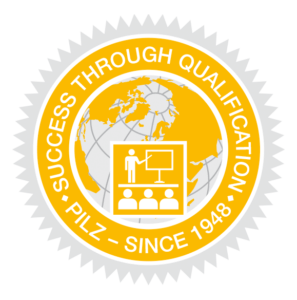
IQP Level
Introduction
Basic
Advanced

Inhalte
Modul 1: Allgemeine Sicherheit und rechtlicher Rahmen
- SICHERHEIT … was ist das?
- europäische Richtlinien, Maschinenrichtlinie & weiter
- wichtige Richtlinien zur CE Bewertung
- österreichische Gesetzeslage, ArbeitnehmerInnenschutzgesetz
und AM-VO - Umbau und Verkettung von Maschinen
Modul 2: Risikobeurteilung und Risikominderung
- Risikobeurteilung nach EN ISO 12100
- Risikominderung
Modul 3: Sichere mechanische Konstruktion
- Grundlegende Handhaben zur mech. Konstruktion sicherer Maschinen, inhärent sicherer Konstruktion und Ergonomie an Maschinen
- Grundlagen zur Anwendung mechanischer Sicherheitseinrichtungen
- Quetschstellen vermeiden, etc.
Modul 4: Funktionale und elektrische Sicherheit
- Grundlegende Handhaben zur elektr. Konstruktion sicherer Maschinen EN 60204
- Funktionale Sicherheit gemäß EN ISO 13849
Modul 5: Sichere Antriebstechnik und Robotik
- Kriterien, Grundlagen und Systemauswahl mechatronischer und elektrischer Antriebe
- Verhalten pneumatischer und hydraulischer Antriebe und Maßnahmen zu deren sicherer Ansteuerung
- Grundlagen elektrischer Antriebe, sowie sicherer Antriebsfunktionen von schwerkraftbelasteten Achsen
- Grundlagen Industrierobotik und Mensch-Roboter- Kollaboration
Zielgruppen
– Konstrukteure
– technische Leiter
– Systemintegratoren
– Betreiber von Maschinen und Anlagen
– Wartungs- / Instandhaltungspersonal
Zertifikat
Am Ende des Kurses können die Teilnehmer per Multiple-Choice-Test die Prüfung zum Pilz Safety Engineer ablegen und erhalten ein entsprechendes Zertifikat.
Introduction to Machinery Safety
Order-No. 1T000013
Objectives
In this training you will gain a basic understanding of the safety requirements in the industry – including information on regulations and standards as well as guidelines for machinery safety.
This one-day training provides you with knowledge about the obligations to be fulfilled when commissioning a machine. This includes relevant laws, standards and a closer look at safety directives and regulations.
The course provides a good technical foundation in the principles of machinery safety.
Contents
Introduction to safety: motivation for safety, key safety issues, health and safety management
International Legislation
– Application on machinery and installations
– Advantages by observanceStandards for conformity assessment (CE)
Safety management systems
Key-facts for realising a safe installation
Machinery safety
– Purchasing of new machinery
– Modification on machinery
– Responsibilities of OEMs and OperatorsRisk assessment
– Dangers, Hazards
– Methods of risk assessment proceduresRisk reduction
Target group
– Beginners in machinery safety
– Designes / Engineers
– Technical managers
– System integrators
– Occupational health and safety representatives
– Technical purchasers / buyes
– Operator of machines and installations
– Maintenance / repair personall
Your advantages



good overview over machinery safety
Better understanding of legislation connections
Course attending without any previous knowledge
| Place | Duration | Time | Max. attendees | Price per attendee | Date |
|---|---|---|---|---|---|
| Online | 1 day | 08:30-16:30 | 15 people | on request | on request |
| In-House | 1 day | 08:30-16:30 | 15 people | on request | on request |
Risk assessment Workshop
Order-No. 1T000107
Objectives
The workshop provides the participants with the knowledge and skills they need to carry out risk assessments on machinery according to EN ISO 12100.
Risk assessments are necessary, a fundamental aspect of machine safety and the first step to comply with legislation (Machinery Directive 2006/42/EC) and standards. This workshop uses tools to guide you through the risk assessment process for machines – always interactive and very close to practice.
The aim is to be able to identify hazards and carry out risk assessments (severity and probability of occurrence). The application of suitable risk reduction measures and the determination of the residual risk are also part of this training.
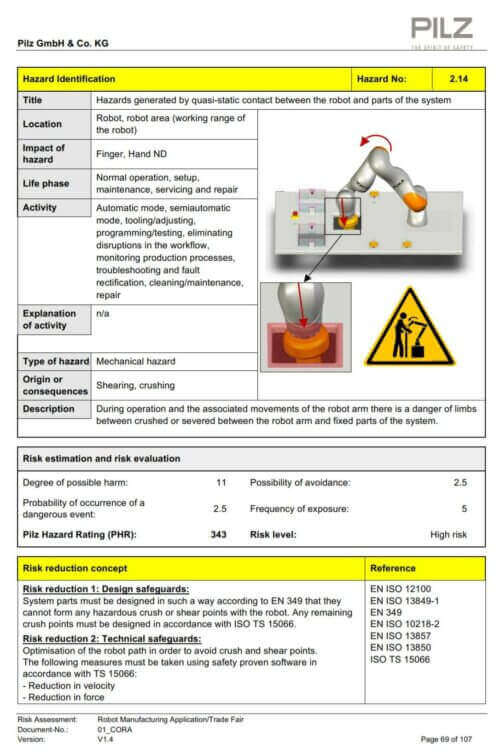
Contents
- Guidelines and standards for risk assessment
- Application of the different evaluation methods
- Hierarchy of risk-control measures
- Risk reduction and residual risk
- Proven risk assessment measures
- Practical examples
Target group
– Designers / Engineers
– Technical managers
– System integrators
– Occupational health and safety representatives
– Operators of machinery and installations
– Maintenance / repair personnel
Your advantages

Comprehensive know-how on how to proceed
as part of the risk assessment

maximum practical orientation based on interactive,
concrete case studies
| Place | Duration | Time | Max. attendees | Price per attendee | Date |
|---|---|---|---|---|---|
| Online (International) | 2 sessions = 8 hours | 09:00-17:00 CET | 15 people | € 550,-- | 02.10.-03.10.2023 |
| Online | 1 day | 09:00-17:00 CET | 15 people | € 550,-- | on request |
| In-House | 1 day | 08:30-16:30 CET | 15 people | on request | on request |
Technical documentation and operating manuals
Order-No. AT999812
Objectives
In this seminar, you will learn what requirements are placed on technical documentation and how to create operating instructions correctly.
The focus here is on implementation based on legal and normative aspects. The theoretical content is accompanied by practical examples that show a continuously structured structure of documentation and instructions.

Contents
- Basic documentation requirements
- Guidelines and standards for creating technical documents
- Creation of operating instructions according to EN 82079-1
and EN 20607 - Practical examples
Target Group
– Documentation officers
– Technical managers
– System integrators
– Occupational safety officers and safety specialists
– Operators of machines and installations
– Maintenance / repair personnel
| Place | Duration | Time | Max. attendees | Price per attendee | Date |
|---|---|---|---|---|---|
| Online | 1 day | 08:30-16:30 | 16 people | on request | on request |
| In-House | 1 day | 08:30-16:30 | 16 people | on request | on request |
Basics of CE-marking
Order-No. 1T000041
Objectives
The CE marking procedure describes the process of certifying products in accordance with the specifications in the European Economic Area. At the end of the process, the affixing of the CE marking, documents, that all necessary safety requirements according to the Machinery Directive 2006/42/EG have been met.
You will receive an introduction to the topics relating to the Machinery Directive 2006/42/EG and its requirements with regard to the CE marking of machines. Which machines are covered by the Machinery Directive? What are the responsibilities of mechanical engineers (manufacturers) and operators (employers)? In this training you will get the answers to these questions that arise in connection with mechanical engineering or the acquisition and commissioning of new and existing machines.

Contents
Scope and requirements of the Machinery Directive 2006/42/EC
Essential occupational safety measures
Harmonized standards in the Machinery Directive 2006/42/E
European legislation around Machinery and work equipment
Principles and procedure for CE marking of machines
Responsibilities throughout the machine life cycle
Documentation requirements:
Declaration of Conformity, Declaration of Incorporation,
Technical Documentation and affixing the CE mark
Target group
– Commissioning engineers
– Designers / engineers
– Project managers
– Planning agents
– System integrators
– Safety officers
– Production managers
– Responsibles for conversions and maintenance tasks
– Technical buyers
Your advantages

Directive compliant CE-marking

High practical relevance through practice and
implementation using an example machine
| Place | Duration | Time | Max. attendees | Price per attendee | Date |
|---|---|---|---|---|---|
| Online (International) | 2 sessions = 8 hours | 09:00-17:00 CET | 15 people | € 550,-- | 23.10.-24.10.2023 |
| Online | 2 sessions = 8 hours | 09:00-17:00 CET | 15 people | on request | on request |
| In-House | 1 session = 8 hours | 08:30-16:30 CET | 15 people | on request | on request |
Functional Safety acc. to EN ISO 13849 | Theory
Order-No. 1T000043
Objectives
The aim of the training is to teach you the processes and standards that are important for the design and evaluation of safety-related control systems.
This training covers how EN ISO 13849-1 (standard for safety-related controls) is applied in automation and in the design of machinery. We also present the requirements resulting from the EN/IEC 62061 standard.
Contents
Safety regulations and standards (introduction)
Standards for safety-related control systems
– EN ISO 13849
– Insights into EN/IEC 62061Detailed overview of the design principles
for safety-related control systemsCalculation of the Performance level (PL)
Presentation of the usual verification tools (software)
Target group
– Designers / Engineers
– Technical managers
– System integrators
– Maintenance / repair personnel
Your advantages

Detailed functional-safety design reviews

Most important architectures and alternatives in the construction of safety-related control systems, including practical examples

Advantages of a structured concept
| Place | Duration | Time | Max. attendees | Price per attendee | Date |
|---|---|---|---|---|---|
| Online (International) | 2 sessions = 8 hours | 09:00-17:00 CET | 15 people | € 550,-- | 25.09.-26.09.2023 |
| Online | 2 sessions = 8 hours | 09:00-17:00 CET | 15 people | on request | on request |
| In-House | 1 sessions = 8 hours | 08:30-16:30 CET | 15 people | on request | on request |
Performance Level calculation with PILZ PAScal
Order-No. 1T000044
Objectives
Based on the circuit structures that you can graphically model, the Safety Calculator calculates and verifies the essential safety variables such as Performance Level (PL) and Safety Integrity Level (SIL) of safety functions in machines and systems. The result is compared with the required safety parameters and displayed graphically.
With this, Pilz provides you with a tool that makes it considerably easier to proceed systematically while complying with the standards, without you having to study the mathematics on which the standards are based.
IQP Level
Advanced

Contents
Principles and terms of functional safety
Brief overview of functional safety
EN ISO 13849 and EN/IEC 62061Various calculation examples using a machine
with the Safety Calculator PAScalIndividual question and answer session
Target group
– Developers of electrical systems
– Electrical Engineers
– Planning agents
– Safety responsible personnel
Hints
Your own laptop must be used in the training with pre-installed PAScal software. You can download PAScal free of charge from www.pilz.at.
In connection with this seminar, we are offering you the full version of the Safety Calculator PAScal at a special price of EUR 100 including a software license.
You save over 200 euros. Contact us!
Your advantages

Concrete implementation of your requirements
using PAScal

Individual advice on your questions
| Place | Duration | Time | Max. attendees | Price per attendee | Date |
|---|---|---|---|---|---|
| Online | 1 day | 08:30-16:30 | 12 people | on request | on request |
| In-House | 1 day | 08:30-16:30 | 12 people | on request | on request |
Safe programming acc. to EN ISO 13849
Order-No. 1T000106
Zielsetzung
Die Norm EN ISO 13849-1 stellt explizite Anforderungen an sicherheitsgerichtete Steuerungssoftware. Die Logik von Sicherheitsfunktionen wird immer öfter auf einem dedizierten Steuerungsgerät programmiert.
Die wesentliche Anforderung der EN ISO 13849-1 an die entsprechende Applikation bzw. SRASW-Software besteht darin, dass deren Entwicklung nach einem V-Modell erfolgen soll.
Die Interpretation der Normen im Detail ist für Software- Entwickler im Umfeld des Maschinenbaus jedoch oft komplex. In dieser Schulung gehen wir auf die normativen Anforderungen ein, die erfüllt werden müssen, damit eine qualitativ gute und sichere Applikationssoftware (SRASW) im Sinne der EN ISO 13849 erstellt werden kann.
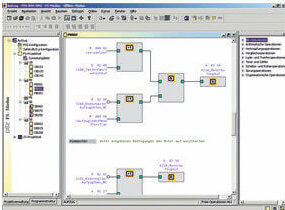
IQP Level
Advanced

Inhalte
Zielgruppe
– Programmierer
– Systemintegratoren
– Wartungs- / Instandhaltungspersonal
PNOZmulti - Programming and maintenance
Order-No. 1T000061
Zielsetzung
Sie erhalten einen Überblick über die vielseitigen Einsatzmöglichkeiten und das Einsparpotenzial mit
den konfigurierbaren sicheren Kleinsteuerungen PNOZmulti 2, PNOZmulti Classic und PNOZmulti Mini.
Anhand praktischer Übungen und Anwendungsbeispiele aus der Sicherheitstechnik zeigen wir Ihnen die besonders einfache und flexible Konfiguration mit dem PNOZmulti Configurator.
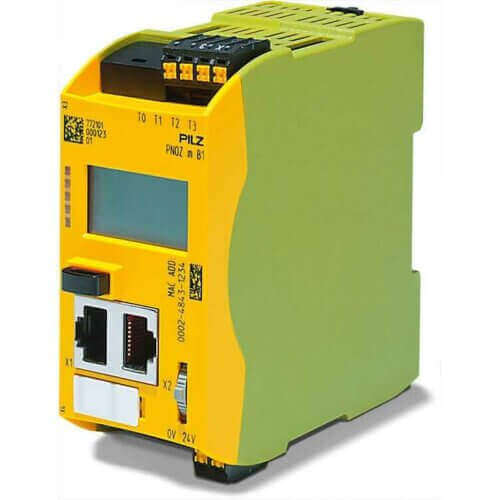
IQP Level
Basic

Inhalte
-
Einführung in den aktuellen Stand der Sicherheitstechnik
-
Handhabung des Softwaretools PNOZmulti Configurator
-
praktische Übungen mit dem PNOZmulti Configurator
-
Programmerstellung mit Not-Halt, Schutztüren,
Lichtgitter und Drehzahlüberwachung -
praktische Übungen am PES-Schulungssystem
-
Diagnose und praktische Fehlersuche am
PES-Schulungssystem mithilfe des PNOZmulti Configurators -
Diagnose mit PVIS bzw. der webbasierten
Visualisierungssoftware PASvisu -
Drehzahlüberwachung und Motion Monitoring
mit PNOZmulti Classic und PNOZmulti 2
Zielgruppen
– Programmierer
– Systemintegratoren
– Wartungs- / Instandhaltungspersonal
Voraussetzungen
– PC-Grundkenntnisse
– Grundkenntnisse der Elektrotechnik
– Eigener Laptop mit vorinstallierter PNOZmulti configurator Software
Hinweis
Die Kursinhalte beziehen sich auf folgende Hardware: PNOZ m B0/B1, PNOZ m (x)p, PNOZ mm (x)p
Ihre Vorteile

praktische Übungen zur Konfiguration und Diagnose an Übungsgeräten

schnelle Konfiguration komplexer
Anwendungen
CMSE® - Recertification
Order-No. 1T000084
Zielsetzung
Damit Sie immer up to date bleiben, ist es erforderlich, Ihr Zertifikat zum CMSE – Certified Machinery Safety Expert alle vier Jahre zu erneuern.
Sie haben vor 4 Jahren das letzte Mal die Prüfung zum CMSE erfolgreich abgelegt?
Dann melden Sie sich am besten gleich zum Auffrischungsseminar an und bleiben Sie stets auf dem neuesten Stand hinsichtlich normativer Grundlagen und aktueller Sicherheitstechnik. In den praktischen Workshops vertiefen Sie noch einmal Ihr Anwendungswissen.

IQP Level
Experte

Inhalte
- Aktuelle Gesetzes- und Normenlage
- Sicherheitstrends
- Risikobeurteilung – Workshop I
- Schutzeinrichtungen – technische Betrachtung
- Funktionale Sicherheit – Workshop II
Zielgruppe
– CMSE – Certified Machinery Safety Experts
Hinweis
Im Laufe des Seminars können Sie Ihr aufgefrischtes Wissen immer wieder durch kleine Selbsttests bestätigen.
Nach Teilnahme an dem eintägigen Seminar erhalten Sie ein TÜV NORD-Zertifikat, das Ihnen die Zertifizierung zum CMSE für weitere vier Jahre bestätigt.
